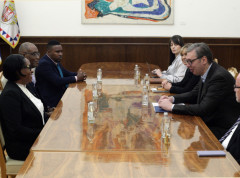Serbian President Aleksandar Vučić received the speakers of the parliaments of St Kitts and Nevis and St Lucia, as well as St Lucia’s Minister of Home Affairs, in Belgrade. They discussed current global affairs, expanding cooperation, and strengthening the role of small states on the global geopolitical stage. Vučić expressed gratitude to St Lucia for its decision to derecognize the so-called Kosovo, viewing it as respect for Serbia’s territorial integrity. He also emphasized Serbia’s readiness to further political and economic cooperation in digital transformation, agriculture, sports, and education. The meeting was described as cordial and important for advancing Serbia’s relations with Caribbean states.
Political Perspectives:
Left: Left-leaning outlets emphasize the diplomatic and cooperative aspects of the meeting, highlighting Serbia’s efforts to strengthen ties with small Caribbean states and the importance of mutual respect for sovereignty, particularly regarding Kosovo. They focus on the potential for development in areas like education, digital transformation, and agriculture, framing the meeting as a positive step towards international solidarity and peaceful cooperation.
Center: Centrist sources report the meeting factually, focusing on the diplomatic engagement between Serbia and the Caribbean states. They note the discussions on global affairs, cooperation expansion, and Serbia’s appreciation for St Lucia’s stance on Kosovo. The coverage is balanced, highlighting both political and economic cooperation without strong editorializing, presenting the meeting as a routine but important diplomatic event.
Right: Right-leaning media emphasize Serbia’s sovereignty and territorial integrity, praising St Lucia’s decision to derecognize Kosovo as a significant diplomatic victory. They highlight President Vučić’s leadership in strengthening Serbia’s international position and the strategic importance of expanding cooperation with Caribbean states. The narrative often underscores national pride and the importance of resisting foreign pressure on Kosovo’s status.







